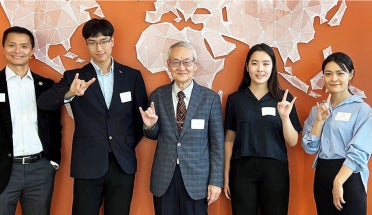
Texas Global Faculty Research Seed Grant Supports International Collaboration
- Feb 11, 2021
- Global Engagement and Strategy
Eleven UT faculty collaborating with peers in Australia, Chile, Egypt, France, Pakistan, Portugal, South Africa, Spain and Jerusalem are the inaugural recipients of the Texas Global Faculty Research Seed Grant, a Texas Global initiative designed to cultivate international partnerships and fund transnational research that addresses some of the world’s most pressing challenges.
Initiated in November 2020, the Texas Global Faculty Research Seed Grant provides financial support to faculty across all disciplines to develop and strengthen new or existing partnerships with leading higher education institutions and organizations around the world. Faculty awardees receive up to $10,000 to aid research collaborations, including sponsoring guest speakers or public lectures, organizing symposia and facilitating other research activities, both in-person and virtual.
The nine funded proposals tackle one or more of the United Nations’ Sustainable Development Goals (SDGs). The SDGs are a central component of the UN’s 2030 Agenda for Sustainable Development, which was adopted by UN member nations in 2015.
“I commend the recipients of the Texas Global Faculty Research Seed Grant for their steadfast commitment to global engagement,” said Sonia Feigenbaum, senior vice provost for global engagement and chief international officer. “They are engaging international peer collaborators to conduct research on questions that transcend borders, including health and well-being, inequality, and sustainability."
February 2021 Grant Recipients and Projects
Kamran Ali, Ph.D.
Professor, Department of Anthropology, College of Liberal Arts
Project Title:
Housing and the Urban Poor in Cairo, Egypt
International Partner:
Martina Rieker, Ph.D. – American University in Cairo
Project Summary:
Within the framework of the UN Sustainable Development Goal #11 (“Sustainable Cities and Communities”) and its focus on sustainable cities and human settlements, we propose to address the issue of housing for the poor in Cairo, Egypt. The research project builds on the ongoing collaboration between myself and Dr. Martina Rieker, Director of Institute for Gender and Women’s Studies (IGWS) at the American University of Cairo. Both Dr. Rieker and I have conducted long-term research in Egypt and are committed to a comparative urban studies paradigm. Our partnership on urban research and network building has been active since 2001 under the auspices of the Shehr Comparative Urban Landscape Network. Coordinated by both of us, the Shehr Network is an academic initiative that seeks to further a social-historical and critical understanding of contemporary cities and urban practices in the Middle East, South Asia, and Africa.
The proposed project builds on our history of cooperation to focus particularly on the changes linked to processes of gentrification and elite capture that is being implemented in contemporary Cairo, which is exasperating the housing crisis for the marginalized and poor. This is, of course, a global phenomenon and, even in the United States, the issue of public and affordable housing is an important one especially with the global pandemic and the threat of looming eviction for many who are economically vulnerable. We believe that this research into affordable housing in Cairo, a mega-city in the Middle East (at the crossroads of Africa and Asia), will help generate important insights into some of the more serious social issues being faced by people across various regions and continents.
Karen Engle, J.D.
Professor, School of Law
Neville Hoad, Ph.D.
Associate Professor, Department of English, College of Liberal Arts
Project Title:
The Future of Work in an Age of Pandemic: The Case of South Africa
International Partner:
Dennis Davis, M.Phil, L.L.D. – University of Cape Town
Project Summary:
This research project will bring together UT Austin and University of Cape Town professors in law, economics, history, and social theory to study the legal and political drivers of the past, present, and future of work in South Africa. It will do so within a larger comparative context of global inequality and increasing levels of domestic inequality and unemployment in South Africa, exacerbated by the COVID-19 pandemic. Through the project, we aim to achieve a better understanding of the possibilities for rethinking the future of work and livelihood in both the global North and the global South and to generate much-needed legal and political responses to the pandemic and its aftermath. The proposed inquiry supports the UN Sustainable Development Goals of “Decent Work and Economic Growth” and “Reduced Inequalities.”
Stephanie Grasso, Ph.D.
Assistant Professor, Department of Speech, Language, and Hearing Sciences, Moody College of Communication
Maya Henry, Ph.D.
Associate Professor, Department of Speech, Language, and Hearing Sciences, Moody College of Communication
Project Title:
Rehabilitating Communication in Bilingual Speakers with Language-Prominent Dementia
International Partner:
Miguel Ángel Santos Santos, M.D., Ph.D. – Sant Pau Biomedical Research Institute
Project Summary:
Primary progressive aphasia is a neurodegenerative syndrome characterized by progressive worsening of communication abilities. This disorder often strikes earlier than typical Alzheimer’s dementia and leads to a diminished ability to engage in activities of daily living (including workforce participation). There is currently no cure for this disorder; however, a growing body of evidence from the field of speech-language pathology has shown that behavioral interventions targeting specific communication skills can lead to improved communication abilities despite ongoing neurodegeneration. The overwhelming majority of studies have engaged monolingual English-speaking participants and little is known about patterns of treatment response in bilingual speakers.
In this research project, we will examine the effects of a tailored intervention program in bilingual (Spanish-Catalan) individuals with this devastating condition via an international partnership. This work will provide crucial information regarding evidence-based treatment for bilingual speakers and will serve as the foundation for ongoing expansion of this work with other international centers.
Tanya Hutter, Ph.D.
Assistant Professor, Department of Mechanical Engineering, Cockrell School of Engineering
Project Title:
Tunable Ionization-based Multi-gas Detector Platform for Environmental, Medical, and Industrial Applications
International Partner:
Vinaya Kumar, Ph.D. – International Iberian Nanotechnology Laboratory
Project Summary:
There is a need for small, low-cost gas sensors that are able to provide gas identification for many applications such as air quality, environment and conservation, agriculture, wearables, homeland security, chemical process monitoring, and medical applications. Currently available technologies are ether only capable of measuring one gas or only provide a total concentration of all gases, without any ability to distinguish between them. Researchers from UT and International Iberian Nanotechnology Laboratory (Portugal) have developed a novel miniature low-cost gas-sensing platform that allows selective detection of several gases and volatile organic compounds. The concept for selective detection is based on the fact that different molecules have different ionization energies, and therefore sweeping of the ionization energy during the measurement allows identification of the molecules.
This project will allow us to obtain results for understanding the effects of key parameters of the gas-sensor technology which are needed for writing a competitive proposal for collaborative external funding for further sensor development and commercialization. In addition, several activities to strengthen the relationship between UT and collaborator and to facilitate knowledge-sharing will be performed, among them a mini-course for UT faculty and students and a collaborative online seminar to establish new connections and collaborations.
Joel Johnson, Ph.D.
Associate Professor, Department of Geological Sciences, Jackson School of Geosciences
Project Title:
Assessing Flood Risks & Controls on Channel Morphology in Earth’s Most Arid Environment: Atacama Desert, Chile
International Partners:
Michal Tal, Ph.D. – Aix-Marseille University
Cristián Escauriaza, Ph.D. – Pontifica Universidad Católica de Chile
Project Summary:
In spite of being the driest region on Earth, the Atacama Desert of Chile receives rare but devastating floods that harm humans and infrastructure. One reason that flood hazards here are poorly understood is that the hyper-arid conditions mean that river channels—completely dry most of the time—occupy a unique hydrological and biological parameter space compared to rivers in other landscapes and climates. We propose to explore how the almost complete lack of vegetation on channel banks and adjacent floodplains influences channel morphology (width, depth, slope, and bed and bank roughness, all of which control how much water can flow within a channel reach before overflowing and flooding) and channel stability (how channels erode and change during floods).
The scientific goals of our study are (1) to better understand how channel morphology relates to flood magnitudes and recurrence intervals in this specific region, and (2) by studying one of the few Earth landscapes with negligible vegetation, to better understand how this key variable influences channel morphology. We propose fieldwork in the Atacama Desert. We will measure high-resolution channel topography using drones, and use these data to calculate river discharge required to cause bank-exceeding floods in these hyper-arid channels. Together with available (though limited) constraints on precipitation and hydrology, our analyses will put quantitative bounds on flood sizes and recurrence intervals in this hyper-arid region. We will also compare our channel data to compilations and theories developed for channels in vegetated landscapes in order to evaluate and interpret similarities and differences.
By providing the preliminary data required for future proposals to be competitive, this seed project would enable us to submit one or more collaborative proposals to national and international funders. We also anticipate publishing a paper based on these results. The basic research we propose addresses UN Sustainable Development Goals related to “Sustainable Cities and Communities,” “Climate Action,” and “Life on Land.” Climate change is already increasing precipitation extremes (i.e., both floods and droughts) in many places across Earth including the Atacama Desert. Improving our understanding of fundamental river feedbacks is important for predicting how river systems and surrounding landscapes will respond to changing flood frequencies and other environmental perturbations.
Cristine Legare, Ph.D.
Professor, Department of Psychology, College of Liberal Arts
Project Title:
Cultural Variation in Adults’ Beliefs about Conformity in Children
International Partner:
Mark Nielsen, Ph.D. – University of Queensland
Project Summary:
This research project is aimed at examining cultural variation in adults’ judgments of conformity in children. We will expand upon previous cross-cultural research conducted in my lab to examine demographic and cultural influences on adults’ perceptions of conformity in children. We will collect data online with adults in Western, industrialized populations (U.S., Australia, New Zealand, Canada, U.K., Germany, France, Denmark, Sweden, and Norway) and non-Western, industrialized populations (China, Japan, Korea, Singapore, and Malaysia). Participants will see examples of children engaging in high versus low conformity behavior and asked to provide behavioral judgments about competency, creativity, and obedience. This research will provide novel insights into how adults reason about relations between conformity, competency, and creativity.
John Lowe, Ph.D.
Professor, School of Nursing
Project Title:
Talking-Yarning Circles to Explore the Educational & Research Inequities among Indigenous Nurses in Australia
International Partner:
Odette Best, Ph.D. – University of Southern Queensland
Project Summary:
The objective of this research project is to establish an international research partnership between Indigenous nurse-led researchers at UT Austin and the University of Southern Queensland. This project will explore the barriers to pursuing and achieving academic and research careers among Indigenous nurses in Australia and the United States. Addressing the need to increase Indigenous nurse researchers will promote the opportunity to strategically position Indigenous nurse scientists to help meet the health care needs of Indigenous peoples, to lead the vision for equity, and meet the UN Sustainable Development Goals of “Good Health and Wellbeing,” “Quality Education,” and “Reduced Inequalities.”
The proposed collaborative project will enhance the opportunities to study and understand how to decrease barriers for Indigenous nurses to achieve advanced education and preparation as nurse academics and researchers. Furthermore, both institutions have highly ranked Schools of Nursing that can innovatively develop exchange possibilities to provide Indigenous nurses with opportunities to obtain advanced preparation as academic and research scholars. This will also increase opportunities for collaborative health research projects that will impact the health inequities of Indigenous people.
Sonia Seeman, Ph.D.
Associate Professor, Butler School of Music, College of Fine Arts
Project Title:
Supporting Music Education at Higher Education Institutions in Pakistan
International Partner:
Arshad Mahmud – National Academy of Performing Arts (Karachi, Pakistan)
Project Summary:
Prof. Sonia Seeman from UT Austin collaborates with director Arshad Mahmud at the National Academy of Performing Arts (NAPA) in Karachi, Pakistan to provide a capstone conference and concert event, called “Sangeet Sangam Music Conference.” This two-day conference event will showcase the musical pedagogical skills of NAPA faculty along with their BSOM colleagues with workshops, panel presentations, lecture-demonstrations for pedagogy, and a final concert of Pakistani and Pakistani-fusion music.
The seed grant will cover travel for up to six UT faculty members and student alumni. This conference event serves as the culmination of a two-semester series of workshops and seminars to train NAPA faculty to develop music curricula, funded by a University Partnership Grant from the United States Educational Foundation in Pakistan (USEFP). As a result of this grant, NAPA faculty will then lead curriculum development/teacher training workshops for faculty and administrators at four Karachi universities: Habib University (HU), Institute of Business Management (IoBM), Shaheed Zulfiqar Ali Bhutto Institute of Science and Technology (SZABIST), and the public sector University of Karachi (UoK). These workshops will set models for the expansion of music training and support in their respective departments, and thereby set a model for music education in Pakistan.
Jasper Smits, Ph.D.
Professor, Department of Psychology, College of Liberal Arts
Project Title:
The Mechanisms of Large-Group Exposure Therapy for Anxiety Sensitivity: An International Collaboration
International Partner:
Jonathan Huppert, Ph.D. – The Hebrew University of Jerusalem
Project Summary:
We will examine a large-group, one-session intervention for the treatment of anxiety sensitivity, or fear of one’s bodily sensations. Anxiety sensitivity is a well-studied risk factor for developing many forms of psychopathology, including anxiety disorders, depression, substance dependence, and more. One of the main interventions that is effective for anxiety sensitivity is conducting exercises like spinning in a chair or hyperventilating that cause exposure to feared bodily sensations. However, we don’t fully understand the mechanisms of this intervention or how it can work in large groups. Therefore, we propose to examine this intervention in 150 individuals (75 per site) with elevated anxiety sensitivity while collecting data on mechanisms of treatment before, after, and at one-month follow-up.
These data will serve as the basis for a larger collaboration between the sites and others, with the goal of creating an international consortium to examine mechanisms of exposure therapy and the best ways to administer and scale up the intervention.



